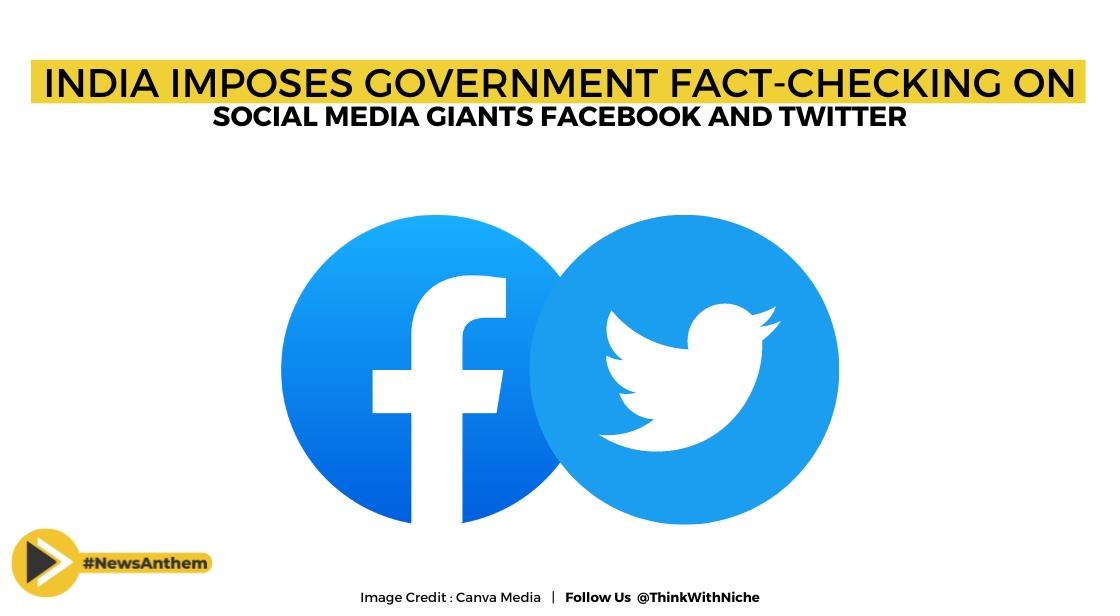India Imposes Government Fact-Checking On Social Media Giants Facebook And Twitter

News Synopsis
India has introduced an amendment to its IT law that prohibits social media companies like Facebook, Twitter, and others from publishing, hosting, or sharing false or misleading information related to government affairs. As per the new rule, these companies are required to rely on the government's fact-checking unit to determine the authenticity of any claims. Failure to comply could lead to a loss of safe harbor protections, impacting not only social media platforms but also internet service providers such as Jio and Airtel.
The Internet Freedom Foundation, a digital rights group based in New Delhi, argues that this rule assigns arbitrary and broad powers to the government for determining the authenticity of online content. The group claims that the move bypasses the principles of natural justice and could have a chilling effect on freedom of speech and expression, particularly for news publishers, journalists, and activists.
India is a crucial market for Facebook, Twitter, and Google, with their services reaching over half a billion users in the country. Over the past decade, Facebook and Google have invested more than $15 billion in India to capitalize on this growth market. These companies have previously resisted some of New Delhi's proposals.
The amended IT law also targets online games offering betting services. The IT Rules 2021 now mandate self-regulatory bodies to ban apps that provide wagering. Rajeev Chandrasekhar, India's Minister of State for Electronics and Information Technology, stated that online gambling and betting platforms challenge New Delhi's vision of an open and safe internet. He further mentioned that the new rules aim to create a stable, consistent, and predictable framework for startups in the online gaming ecosystem.
India's Ministry of Electronics and IT has called on the gaming industry, representing a multibillion-dollar opportunity, to form self-regulatory bodies. The amendment now empowers these bodies to determine which games are allowed in the country. Chandrasekhar explained that any online game involving betting and wagering, regardless of its core content, would be considered in violation of the rules. He also highlighted that some online platforms disguised as gaming services have been involved in criminal activities such as money laundering.
Furthermore, the ministry requires online gaming companies to undergo know-your-customer (KYC) verification before allowing users to spend money on their platforms. Online games will also be prohibited from offering credit financing options to users, either directly or through a third party.
The Indian Premier League (IPL), a popular two-month-long T20 cricket tournament, is a major focus for betting games. According to consultancy firm Redseer, revenue for fantasy sports is expected to grow by up to 35% this year, reaching over $375 million. Fantasy sports startups argue that their offerings test customers' skills, differentiating them from gambling.
Redseer predicts that the rapid growth in fantasy sports gaming will come from tier 2 cities, driven by increased internet accessibility and adoption of fantasy platforms. The firm estimates that the average revenue per user will grow from INR 410 ($5) in IPL 2022 to INR 440 ($5.37) per user in IPL 2023.
India's new IT law amendment is a significant development that will impact social media platforms and the online gaming industry. By requiring companies to rely on government fact-checking and regulating online games, the Indian government aims to address issues related to misinformation and online gambling. While these measures seek to create a more secure and predictable environment for businesses and users, critics argue that they could potentially limit freedom of speech and expression, as well as stifle innovation in the online gaming sector.
The implementation of these new rules will likely have a significant impact on the operations of major US tech giants like Facebook, Twitter, and Google, which have heavily invested in the South Asian market. Compliance with the IT law amendment may lead to increased scrutiny and regulatory challenges for these companies, and could also influence their growth strategies in the region.
As the Indian government takes a more hands-on approach to regulating online content and the gaming industry, it remains to be seen how social media platforms, internet service providers, and gaming companies will adapt to these changes. It is crucial for these businesses to strike a balance between complying with the new regulations and preserving the freedom of speech and expression that has made the internet a powerful tool for communication and innovation.
In conclusion, the IT law amendment in India marks a significant shift in the government's approach to regulating online content and the gaming industry. While the intention behind these changes may be to create a safer and more predictable environment for businesses and users, the potential implications on freedom of speech and expression, as well as the growth and innovation in the online gaming sector, cannot be overlooked. As companies operating in this market adapt to the new regulatory landscape, it will be crucial for them to find a balance that respects both the government's concerns and the values that underpin the internet's growth and success.
You May Like









